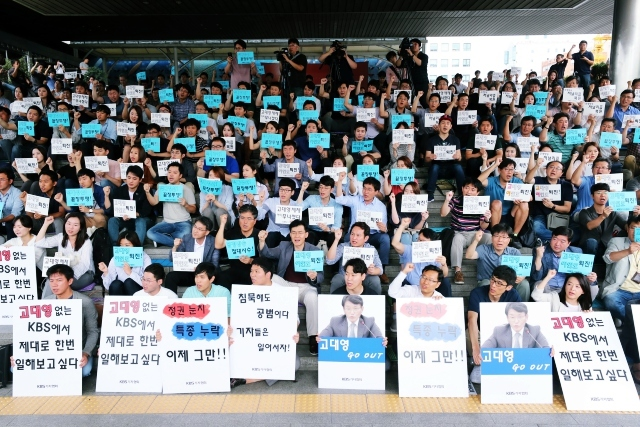JASON KIM WRITES – What began with the ousting of a president may end with the firing of two public broadcast CEOs.
Unionized workers at the Munhwa Broadcasting Company (MBC) and Korean Broadcasting Service (KBS) went on strike September 4 complaining of what they say are unfair labor practices and, perhaps more significantly, political interference in news coverage.
It’s the first simultaneous strike since 2012, and has brought to a halt several popular news and variety shows on the stations.
The strikers claim MBC and KBS have lost public trust by skewing coverage under the administration of President Park Geun-hye, who was recently impeached for corruption. It’s a familiar charge. Because the South Korean president is allowed to pick the head of KBS – and indirectly the leadership of MBC– whichever parties are not in charge typically complain the current broadcast leadership is a stooge for the Blue House. Or in this case, the recently-deposed president.
To set things right, workers want with the joint resignation of Kim Jang-gyum and Go Dae-young, presidents of MBC and KBS respectively. They also want any journalists or other employees who suffered retribution under management to be given justice.
But the renunciations of the two presidents will not provide the labor unions with the justice they seek. MBC and KBS are biased towards South Korea’s ruling party – whoever’s in charge — so even with the renunciation of the administrators, the corrupt framework will remain.
KBS is the national open telecaster of South Korea. As a feature of the country’s Constitution, the head of KBS is handpicked by the South Korean president, upon recommendation of KBS’s board of directors. However, the president and his or her party have the privilege to choose 6 out of 9 board members. This basically gives the South Korean president the power to select the head of KBS.
MBC is also fundamentally controlled by the South Korean president. Following a merger deal, MBC was forced to surrender 70% of MBC’s total shares to KBS. Those shares were then given to the Foundation for Broadcast Culture, whose president is also designated by the President of South Korea.
Rather than asking for resignation, workers should push for a change at the core of the issue: broadcasting stations’ ties to the South Korean government. If the president continues to handpick broadcasting stations’ leaders, the media has no way of preventing bias, making trusting the media difficult.

